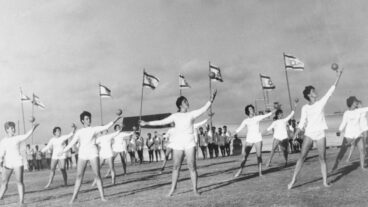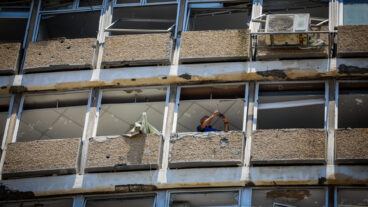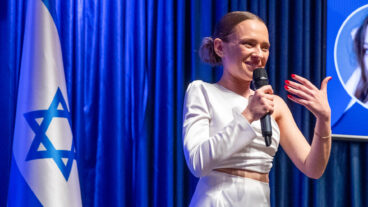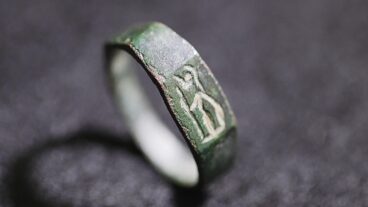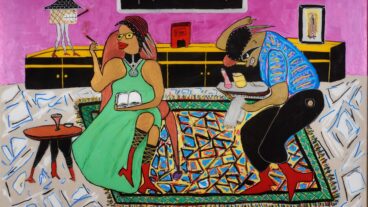Bethlehem designer Hanna Al-ama displays the embroidered shirts which were the result of the Peace Women collaboration.At leading Tel Aviv fashion house Comme il Faut, the usual upscale customers are used to finding the trendiest designs in Israel. But last week, even they had to take a second glance at the latest offerings at the chain’s flagship store on Dizengoff Street.
A display of cotton shirts with the logo “Shalom Banot” (translated as both “Hello Girls” and “Peace Girls”) made of checkered fabric or a combination of cotton and lace and are decorated with colorful embroidery was the main feature in the store and represented the first fruits of labor of a new collaboration between female Arab embroiderers from Bethlehem and Israeli designers from Tel Aviv.
This unique project combines traditional Palestinian styles with modern Israeli fashion – patterns of traditional Middle Eastern designs like flowers or geometric forms embellished on a collar or the back of the shirt – but more importantly it provides a new economic and social forum for both Israeli and Palestinian women and an avenue to provide talented Palestinian artisans with an outlet to sell their wares.
Dubbed the “Peace Women” project, the collaboration was the brainchild of Manuela Dviri, an Israeli actress, writer, and activist whose son was killed in Lebanon while serving in the Israel army.
“Since then she’s worked on bringing Israelis and Palestinians together. She had the idea of connecting women in the Bethlehem area who do embroidery work with some kind of business in Israel,” explained Idit Nirel of the Peres Center for Peace which adopted the project. “Manuela came to us, because she knew we had more ability than her to facilitate something like this, and we went to Comme il Faut together,” she told ISRAEL21c.
They approached Comme il Faut owner and CEO Sybil Goldfiner with the idea, and she immediately embraced it. According to Comme il Faut designer, Limor Diana, the organization has always taken part in social involvement on behalf of women during its 17-year existence.
“Maneula said to Sybil, ‘Palestinian women don’t have any work – they sit in the house all day, and it’s hard for them to get out. Why don’t we do something together for them?’ They came to the design staff and discusse the idea, and we thought about. ‘OK, they know how to embroider – it’s a traditional fashion and done in a certain unique way. Let’s see what we can do with that,'” Diana told ISRAEL21c.
The next step was to hook up the team with the embroiderers on the Palestinian side. Hanna Al-ama is an embroiderer in Bethlehem, who was well-known for owning a bridal gown designing business.
“She said she learned the art from her mother and has done it since she was a child,” said the Peres Center’s Nirel. The Center arranged for her to meet the Comme il Faut design team at a hotel in east Jerusalem late last year.
“For me it was a real experience,” recounts Diana. “She didn’t speak Hebrew or English and we didn’t speak Arabic. And we had to be really accurate because we’re deciding on designs. We had a translator, but it was amazing because we communicated in fashion language – which doesn’t really need words. We said we want this color here, this embroidery here, just by using our hands. After three hours we were exhausted, but it was amazing.”
After a few more meetings, the team arrived at a design for a small collection of shirts that would combine Palestinian embroidery and modern fashion.
“It combines the embroidery in a new way. We use different colors that aren’t traditional and have taken some classic European fabrics and adorned them with the embroidery.The end product is new and fashionable,” said Diana.
Al-ama distributed the embroidery work among 30 Palestinian women in the Bethlehem area. For many of them, the work and wages they received were the first employment they’ve ever had.
“The women are very religious and are not allowed to go out to look for work. Most of the time, they’re in their houses. Hanna took all the instruction from us and divided up the work to a group of women. We paid proper wages for their work – for each embroidery there was a fair price,” said Diana.
The end result is a collection that includes six styles, with only 30-40 items were produced in each style. Purchasers of the shirts will receive them wrapped in a snow-white cotton case, along with a booklet that describes the project, in three languages, and photographs.
The cost of the shirts, like the other items sold at comme-il-faut shops, is high – over $400 for a shirt and $200 for a sleeveless shirt. Comme il Faut’s Goldfiner defended the price to Ha’aretz, saying, “The complaints are voiced because we have an ideology. The talk about feminism creates an expectation that what we are offering is accessible to everyone. Similar charges are not voiced about other stores, which offer local designer clothes at a similar price level, or about the prices of foreign-made designer clothing.”
An organization named Business Council for Peace which specializes in the marketing of products produced by women in conflicted areas, has took upon itself to market the collection in the United States.
We see this as a pilot project, and a model for future projects,” said Nirel. She added that the Peres Center puts an emphasis is on creating strong ties between economic players in each society. Particularly important is the establishment of face-to-face encounters between businesspeople from different communities within the region and the sharing of information and skills.
“Face-to-face encounters allow key figures to meet and discuss ways to overcome the impediments, and to decide on future paths for mutually beneficial trade,” she said.
a sentiment echoed by Diana.
“We see this as a beginning and hope we can continue and create something bigger. We hope this will inform Israelis, Palestinians and people abroad that it’s possible to do something together. And I think that we, as women, makes it easier to communicate. Our interest is usually in keeping people alive, whereas men are making wars.”




